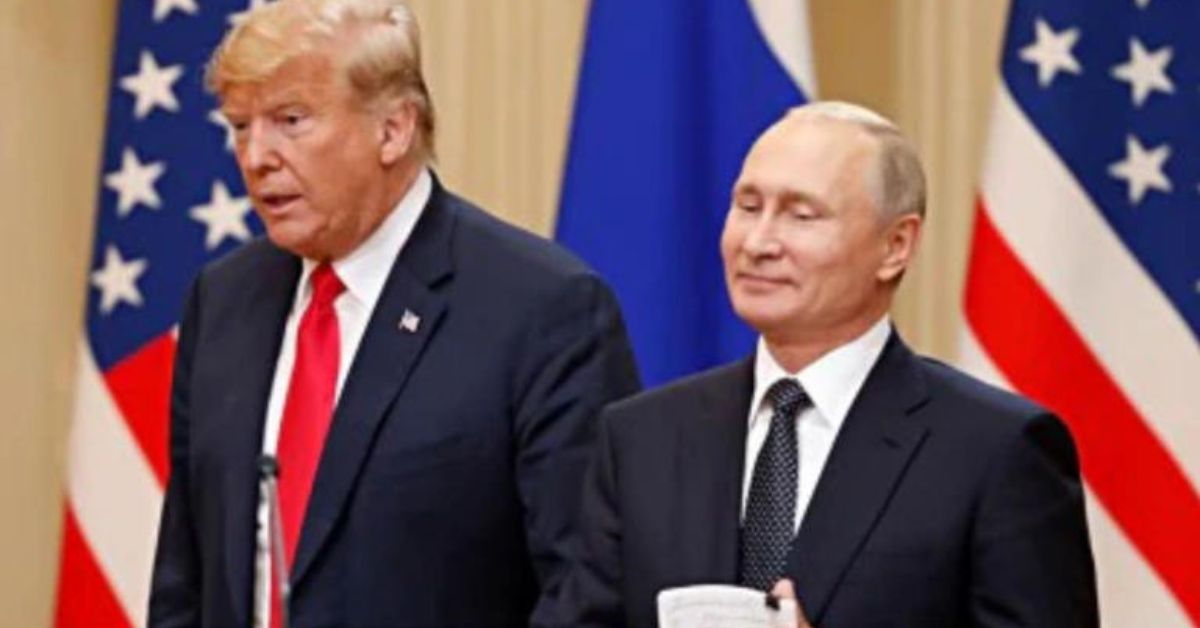Ukraine Attacks: Russia Calls Trump ‘Emotional’ After U.S. President Labels Putin ‘Crazy’ Over
After U.S. President Trump slammed Vladimir Putin as “absolutely crazy” over Ukraine attacks, Russia responded by calling Trump “emotional.” Get the latest on escalating tensions and diplomatic fallout.
U.S.-Russia Tensions Soar After Trump’s Fiery Remarks on Putin and Ukraine
In a dramatic escalation of diplomatic rhetoric, U.S. President Donald Trump publicly lashed out at Russian President Vladimir Putin, calling him “absolutely crazy” in response to Russia’s intensified missile and drone assaults on Ukrainian cities. The Russian government quickly hit back, calling Trump’s remarks “emotional” and attributing them to political stress. This latest verbal exchange underscores the rising tension between two global powers amid an already volatile conflict in Eastern Europe.
Trump’s Outburst Over Russia’s Escalated Attacks in Ukraine
The war in Ukraine reached a new phase of intensity over the weekend when Russia launched a wave of missile and drone strikes targeting Kyiv and other major Ukrainian cities. According to Ukrainian officials, these attacks caused severe infrastructure damage and civilian casualties. The United States responded swiftly, with President Trump breaking his silence and condemning the offensive in stark terms.
Speaking at a press briefing at the White House, Trump said,
“What Putin is doing in Ukraine is beyond insanity. He’s gone absolutely crazy, and the world needs to see this for what it is—an unprovoked, dangerous aggression against a peaceful country.”
This marks one of Trump’s harshest public criticisms of Putin since the conflict began, and his language has caught global attention for its intensity.
Kremlin Responds: Labels Trump as “Emotional”
The Kremlin wasted no time responding to President Trump’s sharp rebuke. Dmitry Peskov, the official spokesperson for President Putin, dismissed the U.S. President’s words as a result of “emotional stress” and political pressure.
Peskov stated in a media briefing:
“These comments reflect President Trump’s emotional state and do not contribute to peace. Despite the rhetoric, Russia continues to advocate for a diplomatic resolution to the Ukraine situation.”
This marks a rare moment where Russia not only refutes the U.S. President’s allegations but also tries to position itself as the party open to peace—despite overwhelming international condemnation for its actions in Ukraine.
Background: What Triggered Trump’s Outburst?
The immediate cause for Trump’s statement appears to be the most recent and deadliest wave of Russian air raids on Ukraine in 2025. On May 25, Russia deployed dozens of drones and long-range missiles, targeting critical Ukrainian energy infrastructure and urban areas. Videos circulated on social media showing plumes of smoke rising over Kyiv, prompting international outrage and urgent security meetings in the United Nations and NATO headquarters.
Sources close to the White House indicate that President Trump was briefed on the scale of the damage and civilian deaths, prompting his fiery reaction. Trump also mentioned that the U.S. is considering a fresh round of sanctions against Russia, including technology bans and financial restrictions.
Also Read: Russia calls Trump ’emotional’ after US president says Putin is ‘crazy’ over Ukraine attacks
Is Diplomacy Still on the Table?
Despite the war of words, the Kremlin insists that diplomatic channels remain open. “We are speaking with international partners. There are ongoing discussions, even with hostile nations,” Peskov said. However, no concrete steps have been announced, and skepticism remains high among Western leaders.
The Biden administration, the European Union, and NATO allies have all urged Russia to immediately halt its military aggression. Meanwhile, Ukrainian President Volodymyr Zelenskyy praised Trump’s condemnation of Putin but called for more direct military support, including long-range missiles and air defense systems.
Analysts Weigh In: Is This the New Normal?
Political analysts say the current verbal tit-for-tat might further erode U.S.-Russia relations, already at their lowest point since the Cold War. Elena Malinova, a foreign affairs expert from the Atlantic Council, said:
“Trump’s rhetoric reflects growing frustration in Washington with Moscow’s disregard for international norms. However, Russia’s attempt to brush it off as ‘emotional’ only adds fuel to the fire.”
She added that Russia’s recent actions show little interest in peace talks, contrary to Peskov’s statements.
International Reactions: Shock, Concern, and Support for Ukraine
World leaders have reacted strongly to both Russia’s attacks and Trump’s statements. U.K. Prime Minister Rishi Sunak called Russia’s aggression “barbaric,” while French President Emmanuel Macron expressed solidarity with Ukraine and echoed concerns over Putin’s unpredictability.
Germany, Poland, and the Baltic States are reportedly increasing security around their eastern borders, fearing spillover or escalation. Meanwhile, humanitarian organizations are scrambling to provide aid to the newly displaced Ukrainians.
What’s Next? Possible Sanctions and Military Aid
Trump hinted at potential sanctions but stopped short of announcing specifics. However, insiders suggest the U.S. could target Russian financial institutions, oil exports, and tech imports in the next round of sanctions.
Congress is also expected to vote on an emergency aid package for Ukraine, which could include additional HIMARS rocket systems, advanced drones, and cybersecurity assistance. A bipartisan group of senators has urged immediate passage of the bill, citing “escalating threats to global stability.”
Social Media Reacts: PutinCrazy Trends Globally
As expected, social media exploded with reactions to Trump’s comments. Hashtags like #PutinCrazy, #TrumpVsPutin, and #UkraineUnderAttack trended on Twitter and TikTok. Many users praised Trump for “finally calling Putin out,” while others debated the impact such language could have on diplomatic efforts.
Some critics argue that Trump’s comments could further endanger negotiations, but others believe that strong language is necessary to confront what they call “21st-century tyranny.”
A Dangerous Path Forward
The exchange between President Trump and the Kremlin highlights the fragile and volatile nature of global politics in 2025. As the war in Ukraine intensifies, rhetoric is becoming as potent as military action. Whether diplomacy can prevail over aggression remains uncertain.
One thing is clear: the world is watching closely as two of the most powerful nations on Earth square off—not only on the battlefield of Eastern Europe but also in the court of public opinion.
